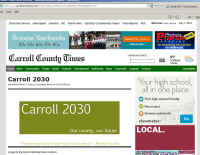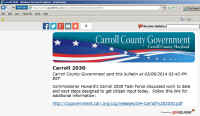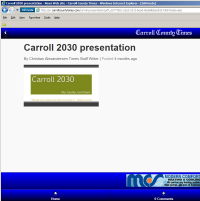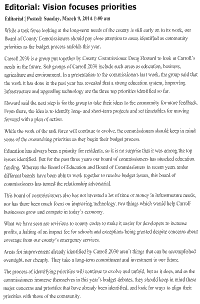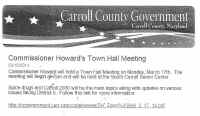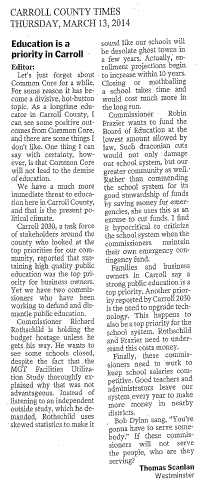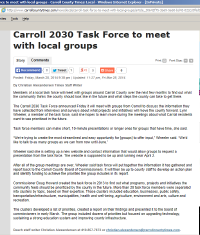| HOME |
A Timeline of Carroll 2030 Evidence & Deceiving the Public-"...a plan that aims to shape all areas of Carroll County in the future."Subversives
are Corporatizing
our Government .
|
|||
|
T I M E L I N E
|
|
|||
|
MD
STATE ORIGIN |
Evidence
that "2030" originates from the United Nations, not from
J. Doug Howard's "idea". Former Senator Donald Fry is the
Maryland State connection to implementation into Carroll County,
MD. [see Timeline date of 11/8/2014] |
|||
|
12/5/2012 (& 2014) |
The Original Introductory Letter of December 5, 2012, Letter to Participants captured at http://www.vision.carr.org. click this text to view then in August, 2014, the Introductory Letter was changed to: http://www.vision.carr.org/docs/letter120512.pdf |
|||
|
06/26/2013 |
1) Chamber of Commerce "Business Cluster Survey - Google Drive" Margaret Soper. Upon examination of this data, one surmises that the 2030 workgroup proffered opinion upon the results of only 73 respondents!
2) Carroll County Times,
"Local task force discusses county's future" "...a
plan that aims to shape all areas of Carroll County in the future."
|
|||
|
10/17/2013
also see 10/18/2013 |
1) Carroll County Times, 2030 Task Force to hold first
event.
|
2) full text of "2030 Task Force to hold first event".
|
||
|
10/18/2013
also see 10/17/2013 |
1
of 2) Announcement: Carroll
2030 Presents: Community Success in a New Economy: |
Additional
information about the "Carroll 2030 Presents":
2
of 2) A
"New Economy"? We ask Carroll County what is a "New
Economy"? Where did it come from. What does "New
Economy" mean? Who invented a New Economy?
NOTE: Have a look at the mentality of the David Ivan Presentation featured at Howard's private workgroup meeting held at the Carroll Community College on October 18, 2013 by clicking his name.
Is this how you think planning should proceed in Carroll County? |
||
| 12/2013 |
Here is further evidence of efforts made to impress select supporters of Doug Howard that Carroll 2030 was sanctioned by the Board of Commissioners, not singularly that of a “private workgroup” of Doug Howard. These were recorded in December of 2013, at Doug Howard’s “2014 Campaign Kick-Off Event”, clearly using the 2030 workgroup for political gain in his re-election. |
|||
|
click the link to view video. This was recorded at a campaign fundraiser for Doug Howard. Ms. Wheeler is on the government payroll.
|
click link to view video.
Mr.Wantz took union money to become a Commissioner. |
click link to view video.
|
||
|
02/10/2014 |
1) RELEASE Howard Town Hall Meeting focus "The
Collaborative Approach to Governance" |
2) Howard Town Hall Meeting Agenda, February 10, 2014: |
||
|
2/26/2014 |
Letter, February 26, 2014, from Carroll County Hospital
|
|||
|
03/06/2014
Note all of the press articles published on 3/6/2014.
Work that had been done in private for over 2 years.
|
1 of 5)
Carroll 2030 Presentation to Board of Commissioners
Official
~
Minutes ~ Board of Carroll County Commissioners VIII. Carroll 2030 Presentation http://tinyurl.com/ozkmegx 3 of 5) Click picture to view larger text.
the original original link has been removed, but originally was: http://www.carrollcountytimes.com/carroll/image_32cdb17c-ac72-565d-8924-082dcf53db9b.html |
2 of 5 ) Windham/Howard Carroll 2030 RELEASE. "Westminster, Thursday, March 06, 2014 – The Carroll 2030 Task Force is made up of industry, business and community leaders brought together, by Commissioner Doug Howard, to begin the process of planning for Carroll’s future by helping to identify the long-range needs and opportunities of the community." Click picture to view larger text. The
above Government graphic was located at this link: http://content.govdelivery.com/accounts/MDCARROLL/bulletins/a9664d Howard's Comments
http://ccgovernment.carr.org/ccg/releases/DH-Carroll%202030.pdf
4 of 5) Click picture to viewa larger text.
5 of 5)
Carroll County Times "Carroll 2030 Group: Technology, education,
infrastructure are key priorities"
|
||
|
3/07/14 |
Doug
Howard/ Windham Announcement: "Westminster, Friday, March 7, 2014 – Commissioner Doug
Howard will be hosting a Town Hall Meeting on Monday, March 17th at the South Carroll Senior Center located at 5928 Mineral Hill
Road, Eldersburg, Maryland 21784. The meeting will begin at 7pm."
With "Introduction
to 2030." |
|||
|
3/09/2014 |
Carroll County Times. Editorial: Vision focuses priorities |
|||
|
3/10/2014 |
1 of 2) click on the picture to view larger text.
The above Government graphic is located at these links: http://content.govdelivery.com/accounts/MDCARROLL/bulletins/a9664d. http://ccgovernment.carr.org/ccg/releases/DH-Carroll%202030.pdf |
2
of 2)
click on the picture to view larger text.
http://content.govdelivery.com/accounts/MDCARROLL/bulletins/aa03ef http://ccgovernment.carr.org/ccg/releases/DH-Carroll%202030.pdf |
||
|
3/13/2014 |
3/17/2014 see, Announcement of 03/07/2014 with "Introduction to 2030" |
|||
|
3/28/2014 |
Carroll County Times: 2030 Task Force to meet with local
groups.
Without Board of Commissioner votes.... As of July 2, 2014 – this Carroll County Times link no longer works.
|
|||
|
7/17/2014 |
[NOTE:
On 7/17/14, the original 2030 website is being changed. Note how the same
Carroll 2030 presentation which was released to the Carroll County Times
on March 6, 2014, been changed to "Presentation to Carroll County
Board of Commissioners" on July 7, 2014, exhitit: [this is a screen shot of the current link on 7/17/14: PowerPoint Presentation http://www.vision.carr.org/documents.asp .
Review a comparison of slideshows presented to the Board of Commissioners on 3/06/14 and 12/11/14 |
|||
| 11/1/2014 |
RINOs Threatening to Subvert Maryland's Most Conservative County Read more: http://www.americanthinker.com/articles/2014/11/rinos_threatening_to_subvert.html |
|||
|
11/8/2014 |
Greater Baltimore Committee chief executive Donald Fry, who served on O'Malley's transition team in 2006, said business groups will be watching Hogan carefully to see if he alters budget items for two major public transit projects: the Red Line in Baltimore and the Purple Line in the Washington suburbs. Fry said it will be the job of business leaders in both regions to explain to Hogan that the rail projects will spur economic development. "There's a lot of expectation that there is going to be a lot of opportunity to be at the table," Fry said. "Business is always looking to be represented.
|
|||
| 3/23/2016 |
Howard proposes revival of long term planning group, Carroll County Times Heather Norris Contract Reporter "Commssioner Doug Howard is proposing the re-creation of a group designated to plan for the county's long-term future. Howard, R-District 5, who spearheaded the Carroll 2030, a group formed in 2012 to accomplish a similar mission that was the subject of criticism from some in the community, said the county needs to look at things through a long-term lens. "As commissioners, we know that many of the decisions we make today will have long-term implications," Howard wrote in a memo to the Board of Commissioners, noting that Carroll 2030 attempted to take a long-term approach during the last board. "Politics aside, there is no question that any community can benefit from long-term planning, and I propose that we pursue as a board, in a very open process, the creation of a Long Term Planning Group," he wrote. The group would comprise 15 members, Howard said, including seven from government and community organizations, and eight citizens or those from citizen groups. The government and community group members would come from the health, education, public safety, infrastructure, municipal, arts and recreation, and business and agriculture sectors. Of the citizen members, one would be chosen from each of the five commissioner districts, another would come from the Economic Development Corporation, another from the Planning Commission and another from the real estate industry. The makeup of the group would aim to encourage input from both Carroll leaders and officials and members of the general community, something criticized in Howard's Carroll 2030 group, which dissolved more than a year ago. "It would be a little more balanced between folks in government and folks not in government," he said. They would have no decision-making authority, but would be a resource for the county, serving to collect information and make long-term planning recommendations, he said. Working together, group members would develop an updated Community Strategic Plan that would serve to create a 15- to 20-year plan for the county, parts of which would be updated every year. Some of the plans he proposed for the new group, Howard said, are designed to address concerns brought forward by critics of Carroll 2030, like Commissioner Richard Rothschild, R-District 4. Rothschild, in a December 2014 meeting of the Board of Commissioners, called the group redundant, pointing out several similarities between Carroll 2030 and the county's Planning and Zoning Commission. He criticized Carroll 2030's closed-door meetings, noting that the Planning and Zoning Commission meetings are open and accessible to the public. Rothschild did not comment on Howard's new proposal at Thursday's meeting and could not be reached for comment by 8 p.m. Thursday. All sessions the new group would hold, Howard said, would be open to the public. The group would also leave things like land-use plans to the Planning and Zoning Commission, focusing instead on things like service needs and community resources, he said. The proposal will be taken into advisement, said Commissioner Stephen Wantz, R-District 1, who serves as the president of the Board of Commissioners. Regardless of who initiates the plan, creating a group to look at the county's future, Howard said, would be a benefit to all of the county, giving individuals from all aspects of county life the chance to meet together and discuss their own needs and goals. "Even though folks see each other a lot, it's very seldom they get to sit down together and discuss these things," he said."
|
|||
| 6/2/2016 |
Editorial: Carroll visionaries needed for Long Term
Advisory Council, Carroll
County Times
"Have a vision for what you want Carroll County to look like five, 10, 20, even 50 years from now? The Carroll County Board of Commissioners has a job for you. On Tuesday, the commissioners agreed to form an advisory group that will make regular recommendations to the board on long-term planning for the county's future. The old saying, "If you fail to plan, you plan to fail," comes to mind here, so we are glad to see the commissioners moving forward with a long-term planning group. We've seen with recent battles over school funding how a lack of an agreed-upon goal and vision to achieve it has stifled progress on that fron However, as the commissioners noted in making their decision Tuesday, a good example of how this has benefited Carroll is when the decision was made years ago to preserve 100,000 acres of county farmland. County government has continued to work toward that goal through its agricultural preservation program even with the myriad personalities and priorities of multiple boards of commissioners. An assortment of county officials and community organization representatives, as well as members of the public, will comprise the Long Term Advisory Council. While the group will have 15 voting members — including eight citizens or representatives from citizen groups — more people could participate without voting status. It will meet and regularly report its ideas to the commissioners. During his previous term, Commissioner Doug Howard began a similar group called Carroll 2030, but it was subject to some deserved criticism about being made up almost exclusively of people collecting a government paycheck and not opening some meetings to the public (albeit legally, because it wasn't technically a government entity). The new group seems to correct those shortcomings. Most importantly, the Long Term Advisory Council is designed to get feedback from the public by having residents make up a majority of the group. Application information should appear on the county's website, www.carr.org, within the next few weeks, and the group is likely to begin meeting in August This group has the potential to be very influential in the direction of Carroll's future. But it needs committed members of our community with great ideas. So, if you've ever thought, "Why doesn't Carroll County have this?" or "What if we did things this way?" or "How come no one ever brings this up?" but didn't know how to make your voice heard, here is your opportunity. Don't pass it up."
|
|||
|
6/2016 |
|
|||
|
8/4/2016 |
Commissioners briefed on charter, code home rule in face
of vocal opposition. Carroll
County Times Heather
Norris Contract Reporter
"Opponents of charter government came out in force Thursday to express their disapproval of any change to the county's form of government ahead of a briefing to the Board of Commissioners by staff on charter government and code home rule. The briefing came at the request of some of the commissioners, including Commissioner Doug Howard, R-District 5, who said earlier in the year that they wanted to explore what would be required to change the county's current commissioner form of government. Howard requested a hearing on the subject in June. Under the county's current government, the Board of Commissioners serves both executive and legislative functions. It is limited in power by rules set by the General Assembly dictating what the board can and cannot legislate. The General Assembly also holds the power to enact laws that specifically affect Carroll County or all counties with commissioner forms of government, County Attorney Timothy Burke told the board. Under charter government and code home rule, the two other forms of county government in Maryland, local bodies have more control over local laws, Burke said. In charter counties, residents adopt a charter that lays out how the county will be governed, including whether there will be a county executive, what elected officials will make in salary and what terms they will serve, Burke said. "Charter government is a check on the General Assembly, you could say," he said. Those counties that adopt code home rule, Burke said, can retain their boards of commissioners but it also allows the commissioners more authority to enact local laws without having to first seek approval from Annapolis Neither code home rule nor charter forms allow the county government to set any new taxes, license fees or franchise fees that were not already in effect, Burke said. Charter governments, he noted, are also exempt from much of the state's land use article, though some counties, like Frederick, opt to abide by it. But many meeting attendees wondered why the issue was being discussed again after having failed several times to pass a countywide vote in the past. Over the weekend, after the date for the briefing was announced, the county Republican Central Committee sent out a news release urging voters to speak out against charter government, which the committee said would cost taxpayers more and serve to consolidate power into the hands of a few. Thirteen people spoke during a public comment period at the board's meeting, all of them in opposition to charter government. Speakers expressed concerns over costs of charter government, and the creation of what many said would be an added layer of bureaucracy in the county. While proponents of charter forms of government point to the fact that charters allow for more local control of local laws, eliminating some of the power the General Assembly holds over counties with commissioner forms of government, speakers on Thursday said they preferred the control Annapolis has over some aspects of county life. The possibility of the county delegation refusing to submit a piece of local legislation requested by the Board of Commissioners to the General Assembly for approval, some said, serves as a mechanism for checks and balances on the county board. "We do not need or want a dictator in Carroll County," said James Graham, a Silver Run resident. Commissioner Richard Rothschild, R-District 4, argued that a commissioner form of government, in which each commissioner holds the same amount of power, helps to reduce the possibility of corruption and ensure that the board acts in the best interest of all county residents. But while that may protect residents at the county level, Howard countered, there is little to certify that the leadership in the General Assembly has Carroll's interests in mind when it decides on Carroll County legislation. While the feedback on Thursday was overwhelmingly negative, commissioners said they had heard a wide array of responses from constituents. Commissioners Stephen Wantz, R-District 1, and Richard Weaver, R-District 2, said they had heard a mix of positive and negative reactions to charter and code home rule since the issue was raised in June. "I understand your passion and I get it," Wantz said to the meeting attendees. But, he said, there are others in the county who have voiced their support for a change in the county's form of government. "We hear just as much on the other side, too, just not necessarily in the mode of walking up to the microphone trying to get their point across," he said. Weaver said he shares some of the concerns brought by community members about cost, but said he would also like to speak to representatives from other counties to learn about their experiences. "I'm really torn at this point in time with where we go in this," he said. Commissioner Dennis Frazier, R-District 3, asked that people try to keep an open mind. A charter, which would lay out how the county would approach the change, hasn't been formed, he noted. "I'm just concerned that people are pre-judging charter before the charter's been written," he said. Some admonished the board for discussing the matter at 1 p.m. on a weekday, when the board holds many of its open meetings but also a time that can be difficult for those with day jobs to attend. Speaker Lyn Mallick urged the commissioners to host a series of community meetings out in the public on the matter, like the county does with its budget. "Let's hear from the citizens because they're the ones who are going to tell you whether or not they want charter," Mallick said. Howard encouraged the board to consider the change. It's a conversation, he said, worth having. "Not going forward means we don't discuss it," he said." |
|||













